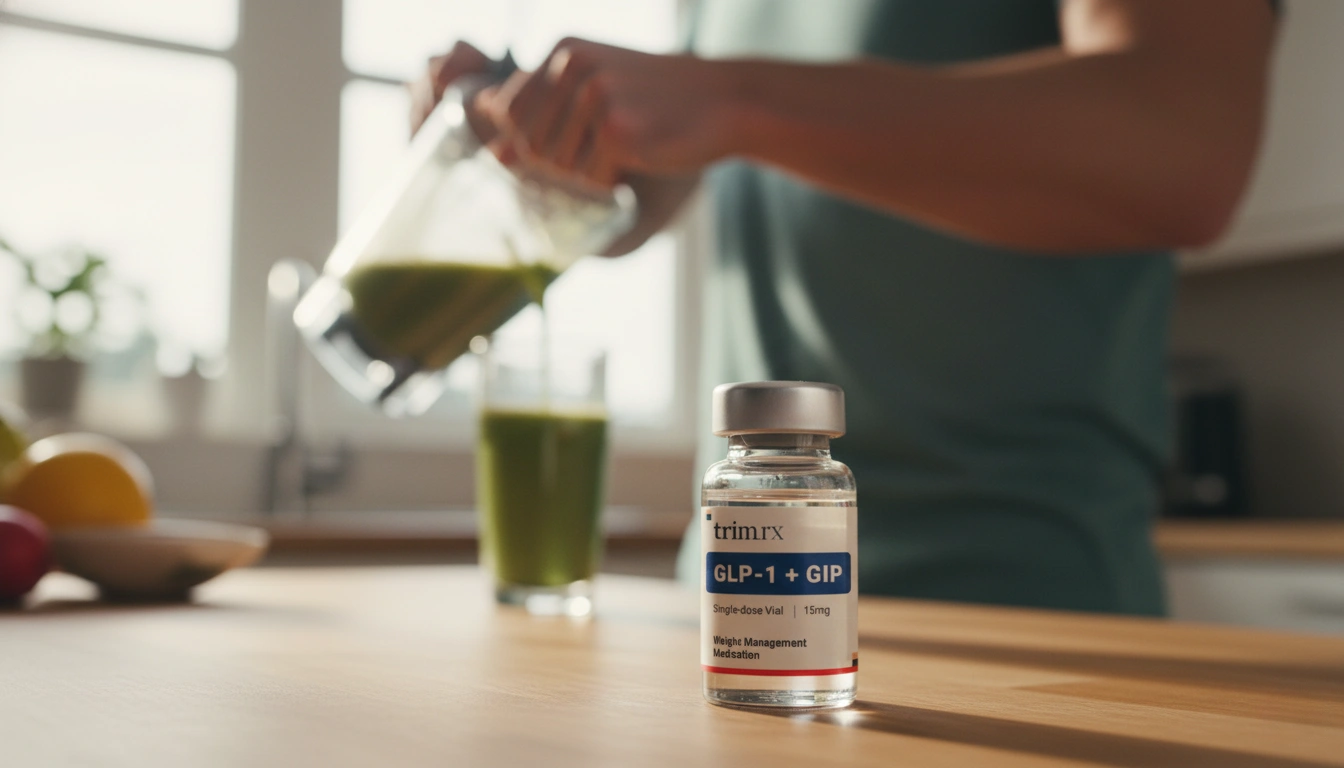Do You Have to Take GLP-1 Forever? Understanding the Long-Term Commitment of Weight Loss Medications

The rise of glucagon-like peptide-1 (GLP-1) receptor agonists in weight management has sparked significant interest and questions among individuals seeking effective and sustainable weight loss solutions. With medications like Ozempic, Wegovy, and Zepbound making headlines for their impressive results, many of us wonder: Do you have to take GLP-1 forever?
Research indicates that while these medications can significantly aid in weight loss, the journey doesn’t necessarily have to be a lifelong dependency. In this blog, we’ll explore the science behind GLP-1 medications, their effectiveness, potential side effects, and what happens when you decide to discontinue their use. We aim to provide clarity on this critical topic, so you can make informed decisions about your weight loss journey.
Introduction
Did you know that nearly 40% of American adults are classified as obese? This staggering statistic highlights the growing prevalence of obesity and the urgent need for effective weight management solutions. Over the past few years, GLP-1 medications have emerged as a beacon of hope for many struggling with weight loss, but they come with the question of longevity: must patients remain on these drugs indefinitely?
The purpose of this blog post is to address this question by examining the mechanisms of GLP-1 medications, reviewing the current research on their long-term use, and discussing strategies for maintaining weight loss after discontinuation. We will delve into the implications of long-term GLP-1 use and provide insights into how you might navigate your weight loss journey with or without these medications.
By the end of this article, you will better understand whether you need to stay on GLP-1 medications forever, and the potential alternative strategies you can consider for maintaining your weight loss success. Together, we will explore various aspects of this topic, from the function of GLP-1 in the body to practical recommendations for sustaining weight loss over time.
Understanding GLP-1 and Its Role in Weight Management
GLP-1, or glucagon-like peptide-1, is a hormone produced in the intestines that plays a significant role in regulating appetite and glucose metabolism. When released, GLP-1 stimulates insulin secretion, inhibits glucagon release (a hormone that raises blood sugar), and promotes feelings of fullness. This hormonal response helps decrease appetite and slow gastric emptying, making it easier for individuals to consume fewer calories and maintain a healthy weight.
How GLP-1 Medications Work
GLP-1 receptor agonists mimic the action of the natural hormone, enhancing its effects. These medications, including Ozempic, Wegovy, and Zepbound, have been shown to achieve remarkable weight loss results. Clinical trials indicate that patients can lose 15% or more of their body weight while using these medications, making them a powerful tool in the fight against obesity.
However, the effectiveness of GLP-1 medications is not solely determined by their pharmacological action. Weight loss is inherently complex, influenced by various factors, including diet, physical activity, and individual metabolic responses. It is crucial to consider these elements when evaluating the potential necessity of long-term GLP-1 use.
The Importance of Lifestyle Changes
While GLP-1 medications can support weight loss, they are not a standalone solution. Individuals taking these medications should also focus on implementing sustainable lifestyle changes, such as adopting healthier eating habits and increasing physical activity. At TrimRx, we believe that a comprehensive weight loss approach includes personalized care and support, which is vital for long-term success.
Summary of Key Points
- GLP-1 medications mimic the natural hormone GLP-1, aiding in appetite regulation and glucose metabolism.
- Patients can achieve significant weight loss with these medications, but lifestyle changes are essential for sustainable results.
Do You Have to Take GLP-1 Forever?
The question of whether individuals must remain on GLP-1 medications indefinitely arises from concerns about weight regain after discontinuation. Research has shown that many patients do experience weight regain when they stop taking these medications.
The Evidence: What Studies Show
A study published by Novo Nordisk revealed that two-thirds of patients who stopped taking semaglutide (the active ingredient in Ozempic and Wegovy) regained significant portions of their weight within a year. This statistic raises valid concerns about the long-term commitment required for those seeking to maintain their weight loss with GLP-1 medications.
However, it’s essential to note that the extent of weight regain can vary among individuals. Some patients may successfully maintain their weight loss through lifestyle modifications, even after discontinuing GLP-1 medications. A recent study from the University of Copenhagen found that participants who engaged in structured weight-loss programs while using GLP-1 medications were able to maintain their weight loss for up to a year after stopping the treatment.
Understanding Weight Regain
Weight regain is a complex phenomenon influenced by several factors, including:
- Biological Responses: The body’s natural inclination to regain weight after weight loss is a significant factor. As individuals lose weight, their metabolism may slow down, and hunger hormones can increase, leading to heightened appetite.
- Environmental Factors: The food environment we live in can make it challenging to maintain weight loss. Easy access to high-calorie, processed foods can complicate efforts to sustain a healthy diet.
- Psychological Factors: Emotional and psychological challenges can also play a role in weight regain. Stress, anxiety, and other mental health factors may contribute to unhealthy eating behaviors.
Summary of Key Points
- Weight regain is a common concern among those who stop taking GLP-1 medications, with studies indicating that many individuals regain a substantial portion of their lost weight.
- Factors influencing weight regain include biological responses, environmental factors, and psychological challenges.
Strategies for Maintaining Weight Loss After Discontinuation
While GLP-1 medications can be effective for weight loss, many individuals may seek alternatives or adjustments after achieving their goals. Several strategies can help maintain weight loss after stopping these medications:
1. Gradual Discontinuation
Rather than abruptly stopping GLP-1 medications, a gradual reduction in dosage may be beneficial. This approach allows the body to adjust and can help mitigate the potential for weight regain.
2. Focus on Nutrition
Maintaining a balanced diet is crucial for sustaining weight loss. Emphasizing whole foods, such as fruits, vegetables, lean proteins, and healthy fats, can support overall health and weight maintenance. At TrimRx, we promote a personalized approach to nutrition, helping individuals identify what works best for their unique needs.
3. Incorporate Regular Exercise
Physical activity is a vital component of any weight management plan. Engaging in regular exercise—particularly a mix of cardiovascular and strength-training activities—can help preserve lean muscle mass and support metabolic health. Aim for at least 150 minutes of moderate-intensity exercise per week.
4. Seek Support
Having a support system can make a significant difference in maintaining weight loss. Whether it’s through family, friends, or professional guidance, accountability and encouragement can help you stay on track.
5. Monitor Progress
Keeping track of your weight and dietary habits can provide valuable insights into your progress. Regularly monitoring your weight can help you stay aware of any changes and take proactive steps to address them.
Summary of Key Points
- Gradual discontinuation of GLP-1 medications, focusing on nutrition, regular exercise, seeking support, and monitoring progress are vital strategies for maintaining weight loss after stopping these medications.
Conclusion
The landscape of weight management is evolving rapidly, with GLP-1 medications playing a critical role in supporting individuals on their weight loss journeys. While there is a concern about the necessity of long-term use, it is essential to recognize that each person’s experience is unique.
By understanding the mechanisms of GLP-1 medications, acknowledging the complexities of weight regain, and implementing supportive strategies for maintaining weight loss, we can navigate this journey more effectively. At TrimRx, our commitment to providing personalized weight loss solutions ensures that you have the tools, support, and guidance needed to achieve your health goals.
As you consider your weight loss journey, reflect on the following questions:
- What lifestyle changes can you implement to support your weight maintenance?
- How can you create a supportive environment that encourages healthy habits?
- Are you ready to take the next step in your weight loss journey?
By taking proactive steps and staying informed, you can make empowered choices that lead to lasting success in your weight management journey.
FAQ
Can I stop taking GLP-1 medications once I reach my weight loss goal?
While many people may wish to stop taking GLP-1 medications upon reaching their weight loss goal, it is essential to discuss this with your healthcare provider. Gradual discontinuation and lifestyle changes can help mitigate weight regain.
What happens if I stop taking GLP-1 medications?
Research indicates that many individuals may regain weight after stopping GLP-1 medications. However, some people can maintain their weight loss through lifestyle modifications.
Are there alternatives to GLP-1 medications for weight management?
Yes, alternatives include lifestyle changes such as diet and exercise, as well as other medications or bariatric surgery, depending on individual needs and circumstances.
How can I maintain my weight loss after stopping GLP-1 medications?
Focus on a balanced diet, regular exercise, seek support, and monitor your progress to help maintain your weight loss after discontinuing GLP-1 medications.
Should I take GLP-1 medications indefinitely?
The decision to continue or discontinue GLP-1 medications should be made in consultation with a healthcare provider, considering individual health goals and circumstances.
If you’re interested in exploring personalized weight loss solutions, we invite you to take our free assessment quiz to see if you qualify for our prescription weight loss medications. Together, we can embark on a journey toward healthier living. You can access the quiz here.
Additionally, if you’re looking for quick-access supplements to support your journey, consider trying our GLP-1 Daily Support or Weight Loss Boost.
Let’s take the next step together in achieving your weight loss goals!

Transforming Lives, One Step at a Time
Keep reading
Vitamin B12 and GLP-1 Medications: What to Know
GLP-1 medications can lower B12 absorption and intake; learn symptoms, food sources, supplement options, and how to monitor levels.
Semaglutide Injection Site Reactions: What To Know
Learn why semaglutide injections can cause redness, swelling or nodules, how to prevent and treat them, and when to seek medical care.
TrimRx vs Friday’s
Compare TrimRx and Friday’s telehealth GLP-1 weight-loss programs: pricing, medical support, coaching, delivery, and which fits your needs.



